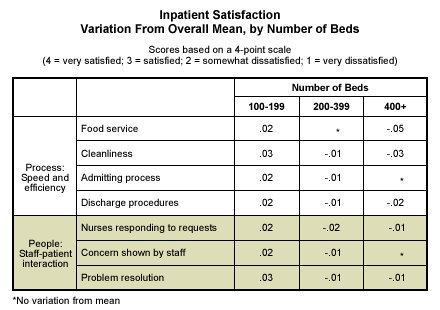The third in a series on the effects of hospital size on patient satisfaction
The previous two articles in this series have examined the correlations between hospital size and 2003 patient satisfaction scores in Gallup's large aggregated healthcare database. Satisfaction with the nation's emergency departments varies notably according to the number of beds in a hospital, but the connection is negligible when it comes to outpatient surgery departments. What about the relationship between hospital size and inpatient surgery, an area in which hospital size should be directly predictive of patient volume?
In a previous analysis, Gallup identified seven specific inpatient satisfaction questions that best differentiate between "average" inpatient facilities from "best-practice" facilities -- those that receive outstanding overall satisfaction scores. Four of the questions are "process" items, relating strongly to hospital operations; the other three are "people" items, relating strongly to employee-patient interactions (see "Can Hospitals Overstress ‘Squeaky Wheel' Issues?" in Related Items).
We looked at the variation from the mean database score on each of these inpatient items for three hospital size categories: 100 to 199 beds, 200 to 399 beds, and 400+ beds. As was the case in both the emergency department and outpatient surgery areas, the variation in scores by hospital size is relatively small in comparison to the variation between average and best-practice hospitals. What does that mean? Size may contribute to inpatient satisfaction, but it is one of many factors that do so.

The smallest hospitals (100 to 199 beds) have a slight advantage over larger hospitals when it comes to inpatient satisfaction on these key items. In particular, the smallest hospitals tend to receive higher ratings on cleanliness and problem resolution. The largest hospitals (400+ beds) score lowest on food service and cleanliness -- two process items that are not strongly linked to overall inpatient satisfaction.
If hospital size does, in fact, affect patient satisfaction, one would expect the strongest relationship in the inpatient area, where the number of patients coming in and out of the hospital is directly dependent on that hospital's number of beds. However, Gallup data show that size is a more significant factor in satisfaction with emergency departments than in inpatient satisfaction.
Bottom Line
Why is the size-satisfaction relationship stronger for the emergency department than for inpatient? Simple statistics could provide part of the explanation: Patient satisfaction scores are lower on average in the emergency department than they are in either the outpatient surgery or inpatient areas, so there is more room for variation according to factors like hospital size.
In addition, Gallup research has shown that facilities with lower patient satisfaction scores have not yet mastered the fundamental "process" components of patient satisfaction, such as wait time -- and these tend to be the areas most affected by a hospital's size. Higher-scoring facilities have generally improved their processes already and are more focused on "people" items (like concern shown by staff), which are more dependent on the quality of the employees than the size of the hospital.
In other words, emergency department processes are often weak or broken, making larger emergency departments more vulnerable to problems associated with high volume. Inpatient and outpatient surgery departments, which have higher satisfaction scores, have fewer process problems. The lesson is this: In order to improve patient satisfaction, inpatient facilities, like any department, should focus less on the size of their hospital and more on hiring the right people.